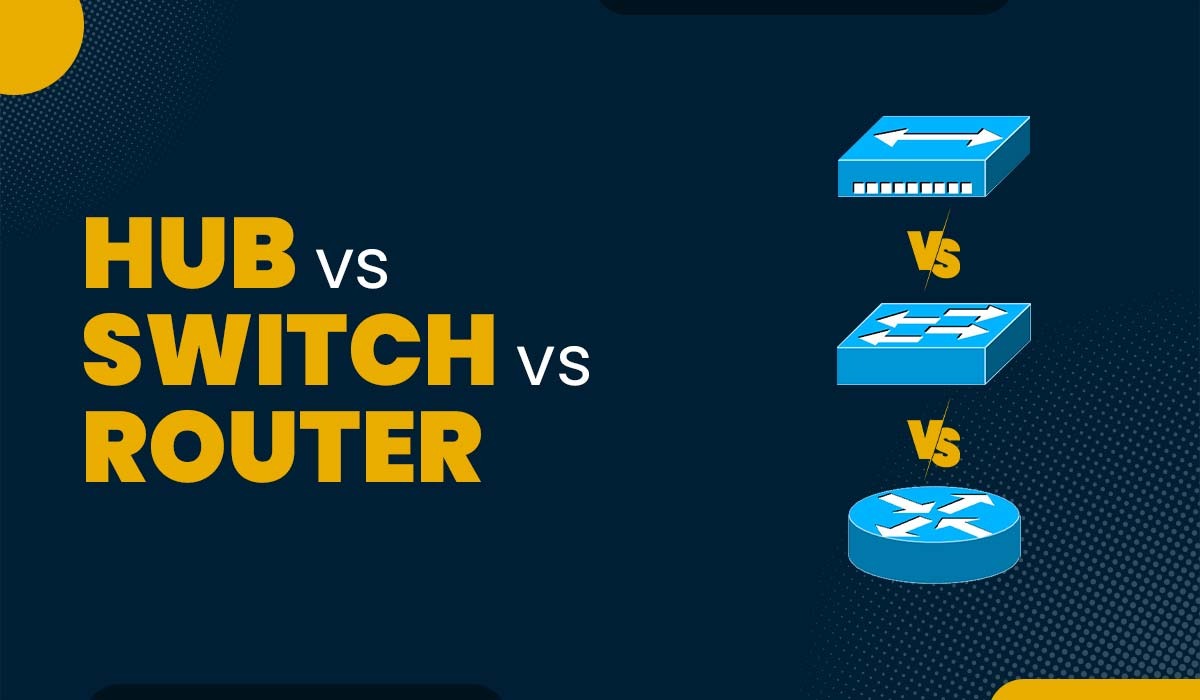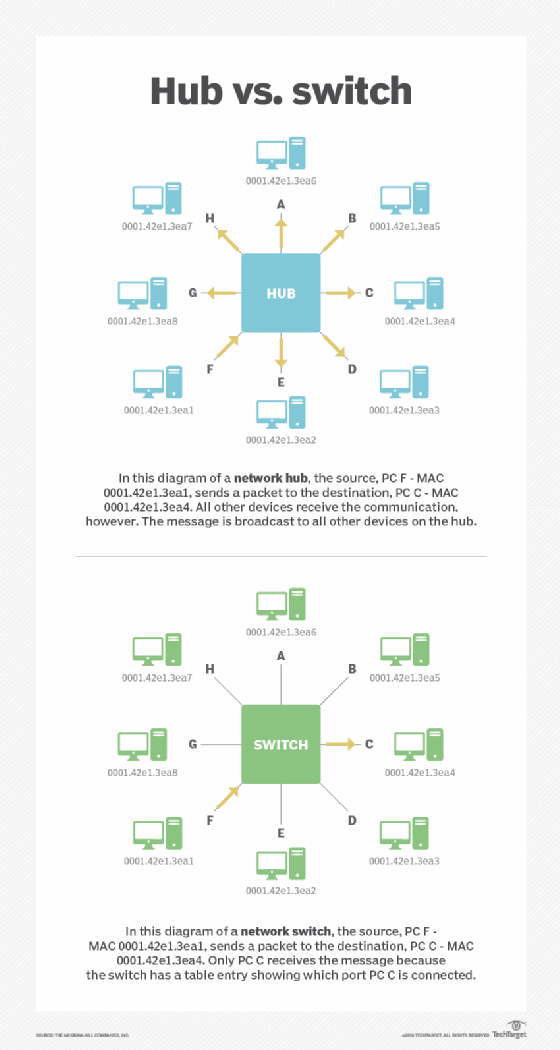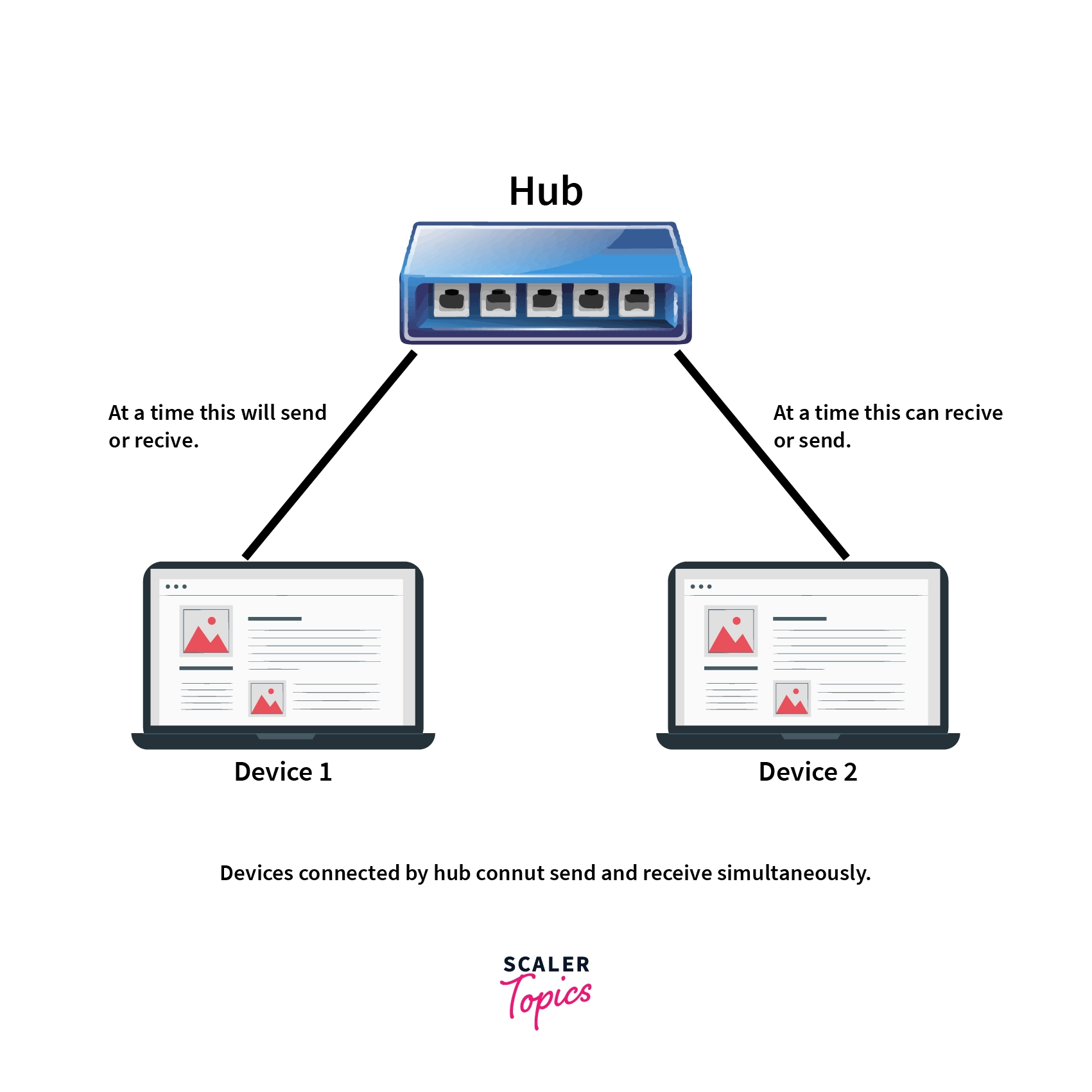Great Info About Why Switches Are Better Than Hubs

Why Switches Triumph Over Hubs
1. Understanding the Basics
So, you're setting up a home network, or maybe you're pondering an upgrade at the office? You've probably stumbled upon the terms "hub" and "switch." They both seem to involve connecting devices, but trust me, they operate on totally different levels. Imagine a hub as a loudspeaker, broadcasting everything to everyone, while a switch is more like a well-trained telephone operator, directing calls precisely where they need to go. That's the core difference, and it's a game-changer for network performance.
Think of it this way: with a hub, every device connected to it hears every message, whether it's intended for them or not. It's like shouting in a crowded room — inefficient and annoying. A switch, on the other hand, learns the addresses of the devices connected to it and only sends the message to the intended recipient. It's like whispering a secret directly into someone's ear — efficient and discreet. This targeted approach is the foundation of why switches are generally the superior choice.
This fundamental difference in how they handle data traffic has major implications. Hubs create what's called a "collision domain," where data packets from different devices can crash into each other, forcing them to be resent. This leads to wasted bandwidth and slower network speeds. Switches, by creating separate collision domains for each port, virtually eliminate these collisions, leading to a much smoother and faster experience. It's like the difference between a one-lane dirt road and a multi-lane highway.
In essence, hubs are relics of the past, a stepping stone on the path to modern networking. While they might have served a purpose in the early days, their limitations are glaring in today's data-intensive environment. Switches offer a far more intelligent and efficient way to manage network traffic, leading to improved performance and reliability. If you're looking to build or upgrade a network, choosing a switch is a no-brainer.

Switches are Smart, Hubs...Not So Much
2. Diving into the Technical Details
Let's get a little more technical, shall we? The intelligence of a switch lies in its ability to learn MAC addresses. Every device connected to a network has a unique MAC (Media Access Control) address, like a digital fingerprint. A switch keeps a table of these addresses and associates them with the corresponding port on the switch. When a data packet arrives, the switch examines its destination MAC address and forwards it only to the port where that device is located.
Hubs, in contrast, operate at a much simpler level. They don't learn MAC addresses. They simply retransmit every incoming signal on all of their ports. This means that every device connected to the hub receives a copy of every data packet, regardless of whether it's intended for them. The device then has to examine the packet to see if it should process it. This process is inherently inefficient and wasteful of bandwidth.
Consider the impact on security. Because hubs broadcast everything, they make it easier for someone to snoop on network traffic. A malicious user could potentially capture all the data being transmitted on the network. Switches, by directing traffic only to the intended recipient, offer a greater degree of security. While they're not immune to security threats, they certainly make it more difficult for unauthorized users to eavesdrop.
Furthermore, switches often offer additional features that hubs lack, such as VLAN (Virtual LAN) support. VLANs allow you to segment your network into logical groups, improving security and performance. Hubs are simply too basic to support such advanced features. So, in terms of intelligence, security, and functionality, switches are clearly the superior choice.

Performance Showdown
3. The Need for Speed (and Efficiency)
When it comes to network performance, the difference between a switch and a hub is like night and day. The collision domain issue, which we touched upon earlier, is a major factor. In a hub-based network, the more devices you add, the more likely collisions become, and the slower the network gets. It's a classic case of diminishing returns.
Switches, by eliminating collisions, provide much more consistent and reliable performance. Each port on a switch operates as its own independent segment, allowing devices to communicate simultaneously without interfering with each other. This is especially important in bandwidth-intensive applications, such as video streaming, online gaming, and large file transfers. Imagine trying to watch a high-definition movie on a hub-based network — you'd probably be tearing your hair out in frustration.
Another factor to consider is bandwidth allocation. Hubs share the available bandwidth among all connected devices. If you have a 100 Mbps hub and ten devices connected to it, each device effectively gets only 10 Mbps of bandwidth. Switches, on the other hand, can often dedicate the full bandwidth to each port. So, in our example, each device connected to a 100 Mbps switch would have access to the full 100 Mbps, assuming the switch supports non-blocking architecture. This makes a huge difference in overall network throughput.
Beyond the theoretical advantages, real-world testing consistently demonstrates the superior performance of switches. In side-by-side comparisons, switches consistently outperform hubs in terms of speed, latency, and overall network responsiveness. So, if you're looking for a network that can keep up with your demands, a switch is the clear winner.

What's The Difference Between A Router, Switch And Hub? TechTarget
The Cost Factor
4. Balancing Budget and Performance
Okay, let's talk about money. In the past, switches were significantly more expensive than hubs. However, the price gap has narrowed considerably in recent years. These days, you can find entry-level switches at prices that are comparable to, or even lower than, those of high-end hubs. Given the dramatic performance advantages of switches, the cost difference is often negligible.
Think of it as an investment. While a hub might seem like a cheaper option upfront, the performance limitations will quickly become apparent, leading to frustration and lost productivity. A switch, on the other hand, offers a much better long-term value. It will provide a more stable and efficient network, reducing downtime and improving overall user experience. Over time, the benefits of a switch will far outweigh the initial cost difference.
Furthermore, consider the energy efficiency of modern switches. Many switches incorporate features that reduce power consumption, such as automatically powering down unused ports. This can lead to significant cost savings over the lifetime of the device. Hubs, being simpler devices, typically lack these energy-saving features.
Ultimately, the decision comes down to your specific needs and budget. However, for most users, the performance benefits of a switch far outweigh the minimal cost difference. Unless you have a very small and simple network with extremely limited bandwidth requirements, a switch is almost always the better choice.

Difference Between Hub And Switch Scaler Topics
Making the Switch
5. Upgrading Your Network for Optimal Performance
So, you're convinced that a switch is the way to go? Great! The good news is that upgrading from a hub to a switch is typically a straightforward process. In most cases, it's simply a matter of unplugging the devices from the hub and plugging them into the switch. No complicated configuration is usually required.
Before you make the switch, it's a good idea to assess your network needs. Consider the number of devices you need to connect, the bandwidth requirements of each device, and any specific features you might need, such as VLAN support or PoE (Power over Ethernet). This will help you choose the right switch for your needs.
When selecting a switch, pay attention to the number of ports, the speed of the ports (e.g., 10/100/1000 Mbps), and any additional features. For a home network, an 8-port or 16-port Gigabit switch is often sufficient. For a small business, you might need a switch with more ports and advanced features, such as managed capabilities.
Once you've chosen your switch, simply plug it into your existing network infrastructure, connect your devices, and you're good to go! You should immediately notice an improvement in network performance. It's a simple upgrade that can make a big difference in your overall network experience. And who doesn't want a smoother, faster, and more reliable network?

Hub Switch And Router, How They Work, Differences, Advantages
FAQ
6. Q
A: While technically possible, it's generally not recommended. The hub will create a collision domain that affects the entire network segment it's connected to, negating many of the performance benefits of the switch. It's best to replace all hubs with switches for optimal performance.
7. Q
A: Honestly, in today's world, it's hard to imagine a scenario where a hub would be preferable to a switch. Even for very small and simple networks, the cost difference is minimal, and the performance benefits of a switch are significant. Perhaps if you were building a network museum, a hub might have a place. But for practical purposes, stick with a switch.
8. Q
A: A managed switch offers advanced features that allow you to configure and monitor your network, such as VLANs, QoS (Quality of Service), and port mirroring. These features are typically not needed for home networks, but they can be valuable for businesses that require more control over their network traffic. If you're unsure whether you need a managed switch, consult with a network professional.